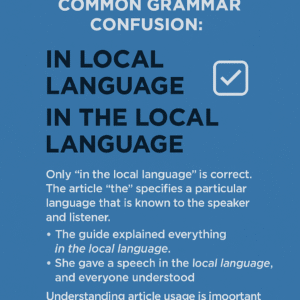English learners often struggle with article usage, and one classic example is the phrase: “in local language” vs. “in the local language.” While both may seem acceptable at first glance, only one is grammatically correct in standard English. This is a typical case of common grammar confusion.
One major cause of this common grammar confusion is the influence of other languages. In many languages, articles like “the” may not exist or may function differently. For instance, in some Asian languages, articles are entirely absent. As a result, English learners may omit them unintentionally, leading to phrases like “in local language” sounding natural—even though they are not standard English. Furthermore, if learners study English in settings where article usage is inconsistently modeled, they often imitate what they hear, which may not always be grammatically correct.
So, which is correct? The answer is: “in the local language.” The definite article “the” is essential here because it refers to a specific, identifiable language spoken in a particular location. Omitting “the” changes the meaning and leads to an unnatural or incorrect sentence.
Here are a few examples of correct usage:
-
“The guide explained everything in the local language.”
-
“She gave a speech in the local language, and everyone understood.”
-
Writers often drop “the” in phrases like “in local language” when creating marketing copy or headlines due to space constraints. However, this structure does not follow correct grammar rules in full sentences or formal writing.
Learners must understand how definite and indefinite articles function to master English grammar. When speakers use the phrase “the local language,” they clearly indicate that both they and their listeners know which specific language they mean—whether it’s Spanish in Mexico, Swahili in Kenya, or Japanese in Japan.
To improve, learners should practice reading well-edited texts and listening to clear spoken English. Over time, phrases like “in the local language” will feel more natural. It’s a small word—but one that makes a big difference in clarity and correctness.

The Wife of Bath: https://englishlitnotes.com/2025/05/26/wife-of-bath-in-the-canterbury-tales/
China’s Way to Progress: https://englishwithnaeemullahbutt.com/2025/06/03/chinas-way-to-progress/
William Cullen Bryant: https://americanlit.englishlitnotes.com/william-cullen-bryant-contribution/
On time, in time & the right time:
https://grammarpuzzlesolved.englishlitnotes.com/difference-in-time-on-time-right-time/
Discover more from Grammar Puzzle Solved by Naeem Ullah Butt
Subscribe to get the latest posts sent to your email.